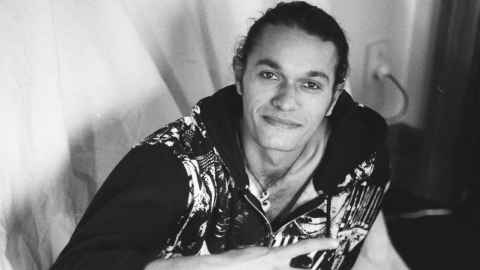Māori dance pioneer honoured with new prize
20 November 2025
A leading figure in Māori contemporary dance in Aotearoa, Stephen Bradshaw (Ngāti Maru), has been honoured with an award in his name at the University of Auckland.

With a career that reshaped the landscape of contemporary dance in Aotearoa, Stephen Bradshaw (1963-2024) became a guiding figure for Māori artists exploring contemporary expression.
Now the Stephen Bradshaw Māori Contemporary Dance Prize, established this year at the University of Auckland, will reward and support future Māori dance students to follow in his footsteps.
Lecturer in the School of Dance Studies, and personal friend and colleague of Bradshaw’s, Dr Tia Reihana, says the award is a fitting tribute to an extraordinary artist and mentor.
“Stephen was a visionary whose work transformed the landscape of Māori contemporary dance. He had an extraordinary ability to bring ancestral knowledge into conversation with contemporary form, showing that Māori movement could be both deeply cultural and boldly innovative.
“He was not only an exceptional artist but a generous teacher and mentor. His influence continues to ripple through the generations, shaping our understanding of Māori creativity today.”
Reihana says the prize is one of the outcomes of the University’s Research Development Fund (RDF) project Te Kanikani o te Rangatahi & Taiao Dance Theatre.
“This ongoing research explores the legacy of Indigenous contemporary dance in Aotearoa from the 1980s to the 1990s, with a focus on the pioneering work of Stephen Bradshaw and the collectives he helped shape.”

She says through archival restoration, hui and wānanga, the project has brought together artists, whānau and community members to share and strengthen this important history.
A recent milestone, says Reihana, was the whānau event and wānanga held at the University’s Waipapa Marae to formally establish the Bradshaw prize.
“The gathering brought together Stephen’s whānau, collaborators and members of the Māori arts community, supported by our Pro Vice-Chancellor Māori Professor Te Kawehau Hoskins, Michael Steedman (Kaiarataki), music lecturer Associate Professor Te Oti Rakena (Te Tumu) and our kaiārahi Leanne Tamaki.
"It was a meaningful opportunity to reconnect with the whakapapa of Māori contemporary dance and to acknowledge Stephen’s contribution to the field.”
A specially created taonga, called 'He Whakatipu Kareao' and carved by Bradshaw’s son, Raika Whakarongotai Bradshaw Stevens, will be given to each recipient of the prize, which is now open for applications and comes with a $1000 stipend.
Reihana says the carving also "acknowledges the legacy of Stephen for each recipient who is pursuing a future in Toi Māori in the Dance Studies Department (Ngā Akoranga Kanikani)".

Māori contemporary dance pioneer
Stephen Bradshaw began his professional training at Limbs Dance Company in 1981 and in succeeding years, performed with the Auckland Opera and Ballet Company and attended the New Zealand School of Dance.
In the mid-eighties, he joined the Tamaki Creative Māori Arts Scheme as a dance teacher, which led to the creation of Te Kanikani o te Rangitahi (‘the dance of youth’), a company that gave Māori young people a platform for expression. The company went on to stage successful works that blended Māori identity with contemporary dance.
From 1995 to 1999, he studied dance at the University of Auckland, and in 2001, wrote a seminal essay that remains a cornerstone of Māori contemporary dance literature, looking at issues of cultural continuity, colonial constructs, and the inadequacy of ‘traditional’ vs. ‘contemporary’ labels in dance.
Stephen worked with diverse communities, recognising their creativity, potential, and mana; including those whose experiences are often overlooked, such as people navigating unemployment, hardship, or the justice system.
In 2010, he received the Kowhiti Lifetime Achievement Award for his immense contribution to Māori dance, an award whose later recipients include Taiaroa Royal and Suzanne Renner.
Bradshaw will be remembered, say Reihana, as someone who supported and uplifted people through his practice, embodying ponotanga (speaking truth with humility).
“Stephen worked with diverse communities, recognising their creativity, potential and mana; including those whose experiences are often overlooked, such as people navigating unemployment, hardship, or the justice system.”
Reihana says outcomes for this ongoing Māori contemporary dance research, which she is leading through Dance Studies in the University’s Faculty of Arts and Education, include community engagement with whānau and alumni, archival restoration activity, and next-step plans for teaching and research integration, as well as artistic events.
Media contact
Julianne Evans | Media adviser
M: 027 562 5868
E: julianne.evans@auckland.ac.nz